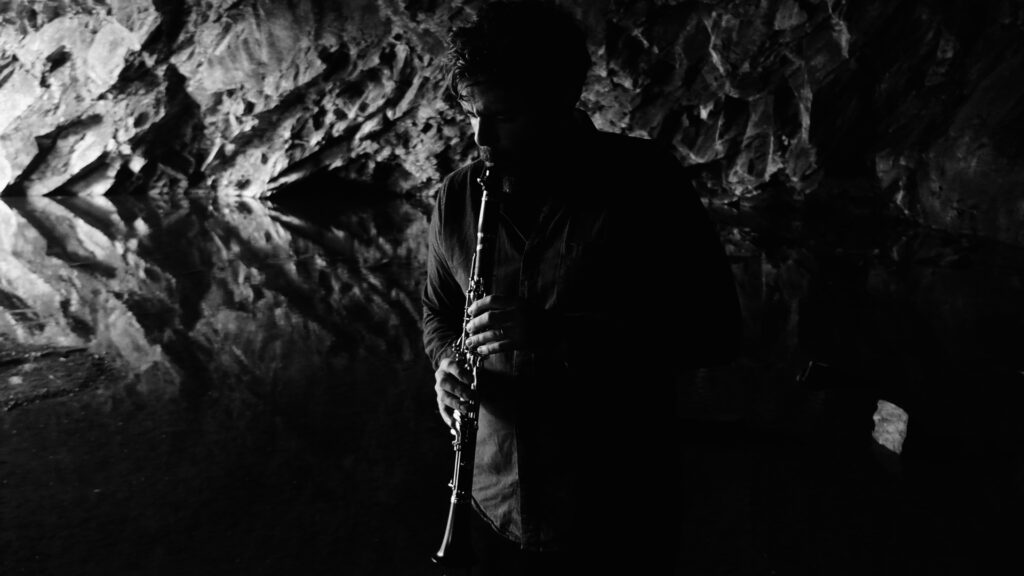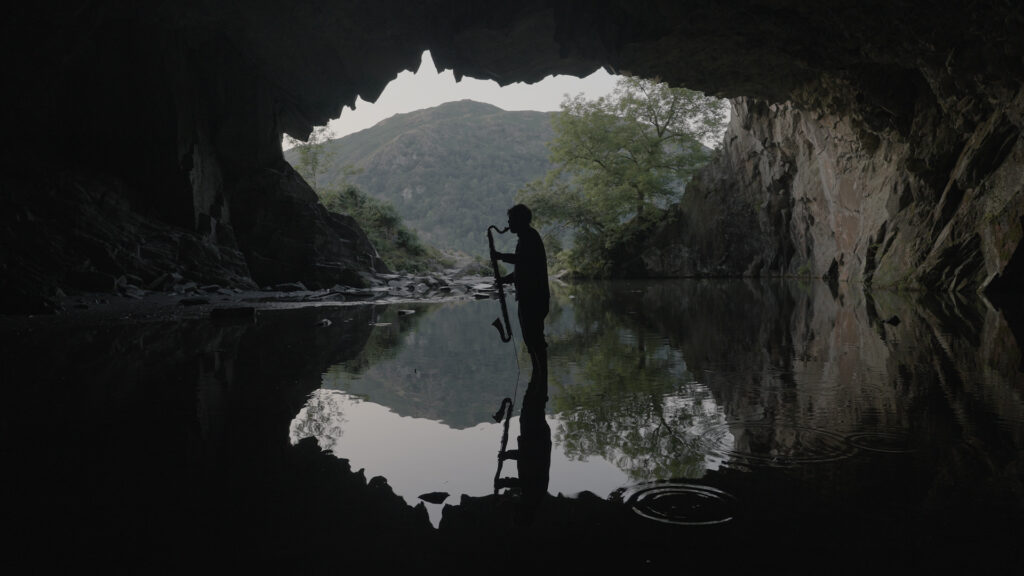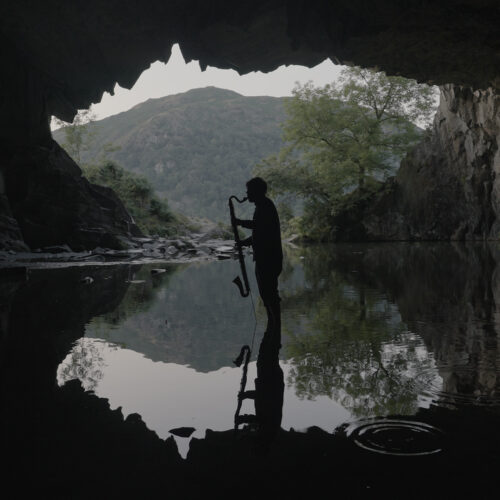“On the scene the clarinet is known as ‘the misery stick’,” says Jack McNeill from his home in Cumbria (Lake Windermere is visible in the distance) as he explains the deep origins of Chamber Cairn, this month’s exclusive release to Quietus subscribers. “It’s such a versatile instrument in terms of where it can sit with genres, and the bass clarinet in particular has a bigger range than a cello, but it’s under-regarded. It’s only ever allowed to do a few different things”. This is certainly not the case on Chamber Cairn, nine tracks of tactile playing, in which McNeill’s breath drifts around the rattling keys, deep reverberations of the barrel, and the space of the old church in which it was recorded.
McNeill, who fell in love with the clarinet as a child in Cumbria via playing a wild variety of styles and genres in bands and ensembles, before taking up his formal studies at the Royal Birmingham Conservatoire. He credits teachers like Tim Lines and Michael Harris, who had worked with Benjamin Britten, as being generous with their time, their sense of enjoyment in playing, and their discipline. “I really had to knuckle down,” he says, “I had a pair of teachers who kind of were both forward looking in their generation, which I only realise now really rubbed off on me.” Yet other elements of the education, and the limitations placed on the clarinet, sat less comfortably with McNeill. “There’s a weird ossification in the classical music world,” he says, “it’s taken a long time for anything to become fluid again and for contemporary musicians to be given the space to bring the audiences themselves along for the ride with whatever they choose to make.” Over the course of his career, McNeill has tried to realise this fluidity in collaborations that include Hidden Orchestra, Mahogany Opera, the Orchestra Of The Swan, various theatre organisations and his own Propellor Ensemble, founded with like-minded musicians nearly a decade ago. Last year, McNeill collaborated with Hayden Thorpe on his excellent album based on Robert Macfarlane’s text Ness, with Propellor members contributing to the live incarnation of the project.
Now, comes Chamber Cairn. McNeill had always wanted to make a solo album, but his busy schedule with Propellor and beyond always got in the way. The crunch came with the impact of Covid lockdowns on his career, with orchestras mothballed and tours impossible. Then there was the imminent arrival of a baby and the move back to his native Cumbria, both of which set off a need to mark this moment with music that was very much his own. “I definitely still had an itch to scratch,” he says. The title feeds from the “idea that cairns mark out space and time, people add to them, small details in a landscape but they get left along away. They speak to you having been somewhere and then moved on.” Then there’s the meaning of the chamber cairn as a place of burial (mostly during the Neolithic period), and endings. “Sonically they’re very strange places, but also deep in our own history places where not many people would have been allowed to go into, and important things happened there.” For McNeill, this idea of an ending was especially resonant because “for lots of reasons I really genuinely thought I might just have to stop playing the clarinet.” Life pressures, the needs of a growing family and making money to support them, might mean the end of the relationship with the instrument he’d played for most of his life.

Just as a chamber cairn encloses space, there’s that intense sense of the physicality of the music throughout this release, aided and abetted by producer Cameron Malcolm and mastering engineer Fridtjof Lindeman. “What I love about string music in general is that you’re able to hear the bow, the rosin and you hear air in a different way, and a lot of wind recordings basically try and get as far away from that as possible,” McNeill explains. The intention with Chamber Cairn was to do the opposite. He and Malcolm spent two days recording in an old, barely used church in the village of Rusland, located in the quiet country between Windermere and Coniston Water. They worked in a gap of clear weather between a period of storms, the surrounding landscape drowsy with heat, and with huge flies buzzing around trying to infiltrate the recording, which began from improvisation. McNeill and Malcolm used as many mics as possible, not just those intended to capture the sound of moving air, but contact mics on his throat, or the body of the instrument. Then percussive elements were brought in via further contact mics on pieces of wood he describes as “sound tables”, the recordings run through various effects. Added to this were clattering stones, and two Swanee whistles taped together. Footage to accompany two tracks, ‘Air Song’ and ‘Buzzard’, was shot one evening in Rydal Cave, a huge cavern left over from the Cumbrian slate industry. “In my head, that was the chamber cairn,” McNeill says, “this idea that in times of hardship people have gone into the earth, and I wanted it to sound like that. I wanted it to sound like we’ve gone for cover.”
While McNeill has his frustrations with how the folk tradition, like the classical canon, can become ossified, he sees Chamber Cairn as a piece that will evolve beyond his initial recording. “I wanted to write a new type of instrumental folk music that could potentially be an open source thing that I could give to people – ‘here’s a tune, do what you like with it’.” So this Quietus subscriber release might be seen as a stone in Chamber Cairn’s evolution, before it moves out into the world to take new forms, with new musicians.
In the end, Chamber Cairn isn’t the end of Jack McNeill’s relationship with the clarinet, but sits as a marker for the start of a new phase of life in Cumbria. In an area of the UK so fetishised for its topography, you might expect a musician like McNeill to be creating work that responds directly to the landscape, but it’s not so simple. Just as Chamber Cairn’s physicality subverts our expectations of the clarinet as an instrument that hymns the pastoral, he’s just as concerned about the problems facing local people in finding affordable places to live, and the consequences that this has for the creative community around him. “For a long time, I was really concerned with environmental issues and soundscape ecology, which is this science of listening to the health of the planet,” he explains. “At the moment, I find myself bombarded daily by people making nature music and it all feeling like some sort of weird premature requiem for the natural world. And as much as I’m aware of the destruction that has already taken place and the kind of the pace at which these cascades are coming, for me, music’s role at the moment should be about bringing people together, giving us something to value with one another in this space.” With this in mind, he’s working on plans to develop a creative infrastructure, and even set up a forest school, as well as working on a huge interactive sound piece that brings in the voices of its own audience via a breathwork app. It’s all aimed towards a vision of, as he puts it, “this idea of providing the creative context for mass cultural happenings.” In Jack McNeill’s hands, the “misery stick” becomes a means of connection.
To hear Jack McNeill’s Chamber Cairn, support the Quietus with Subscriber Plus
…


